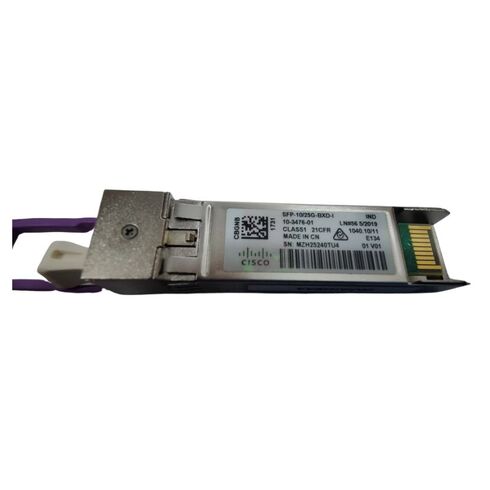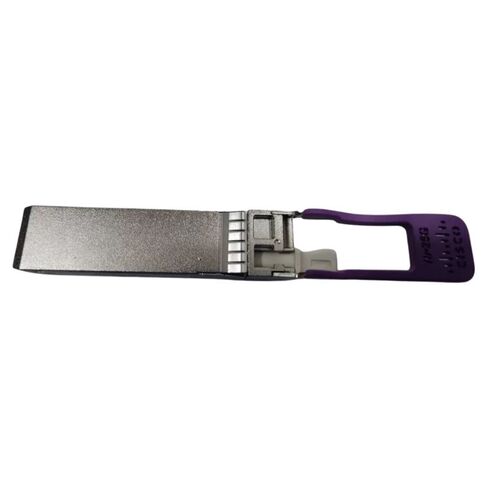SFP-10/25G-BXD-I Cisco SFP28 Transceiver Module, SMF LC Connector, 10/25G Bi-Directional,
Brief Overview of SFP-10/25G-BXD-I
Cisco SFP-10/25G-BXD-I SFP28 Transceiver Module with Single Mode Fiber LC Connector for 10/25G Bi-Directional Communication. Factory-Sealed New in Original Box (FSB) with 1 year replacement warranty
- — Free Ground Shipping
- — Min. 6-month Replacement Warranty
- — Genuine/Authentic Products
- — Easy Return and Exchange
- — Different Payment Methods
- — Best Price
- — We Guarantee Price Matching
- — Tax-Exempt Facilities
- — 24/7 Live Chat, Phone Support
- — Visa, MasterCard, Discover, and Amex
- — JCB, Diners Club, UnionPay
- — PayPal, ACH/Bank Transfer (11% Off)
- — Apple Pay, Amazon Pay, Google Pay
- — Buy Now, Pay Later - Affirm, Afterpay
- — GOV/EDU/Institutions PO's Accepted
- — Invoices
- — Deliver Anywhere
- — Express Delivery in the USA and Worldwide
- — Ship to -APO -FPO
- — For USA - Free Ground Shipping
- — Worldwide - from $30
Same product also available in:
| SKU/MPN | Warranty | Price | Condition | You save |
|---|---|---|---|---|
| SFP-10/25G-BXD-I | 1 Year Warranty | $690.00 | Factory-Sealed New in Original Box (FSB) | You save: $241.50 (26%) |
| SFP-10/25G-BXD-I | 1 Year Warranty | $575.00 | Excellent Refurbished | You save: $201.25 (26%) |
Main Specifications of Single Mode Fiber Module
Device Overview
- Type: SFP28 Transceiver Module
- Part Number: SFP-10/25G-BXD-I
- Form Factor: Plug-in Module
- Color: Violet
Networking Features
- Connectivity Type: Wired
- Cabling Standards: 10GBASE-LR, Ethernet 10GBASE-BR, 25GBASE-BR
- Data Link Protocols: 10 Gigabit Ethernet, 25 Gigabit Ethernet
- Data Transfer Speed: 25 Gbps
- Optical Wavelength:
- Transmitter: 1320-1340 nm
- Receiver: 1260-1280 nm
- Maximum Distance: Up to 6.2 miles
- Special Features: Bidirectional, Peach Pull Tab
Expansion and Connectivity Options
Interface Details
- Supported Interfaces: 1 x Ethernet 10GBASE-BR/25GBASE-BR
Compatibility Information
Compatible Part Numbers
- N540-12Z20G-SYS-A=
- N540-12Z20G-SYS-D
- N540-12Z20G-SYS-D=
- N540-28Z4C-SYS-A=
- N540-28Z4C-SYS-D=
- N540X-16Z4G8Q2C-A=
- N540X-4Z14G2Q-A
- N540X-4Z14G2Q-D
- NC57-MPA-12L-S-FC=
- NCS-57C1-48Q6D-S
- NCS-57C3-MOD-S
- NCS-57C3-MOD-SE-S
- NCS-57C3-MOD-SE-S=
- NCS-57C3-MOD-SYS
- NCS-57C3-MOD-SYS=
Connector: LC
The Cisco SFP-10/25G-BXD-I SFP28 Transceiver Module features an LC connector, which is widely used in the networking industry for its reliability and performance. The LC connector is a small form-factor fiber optic connector that is commonly used in high-density applications. It is known for its compact size, ease of use, and excellent optical performance.
Benefits of the LC Connector
The LC connector offers several benefits that make it a preferred choice for many users:
1. Size and Density
The LC connector is half the size of its predecessor, the SC connector. Its small form-factor allows for higher port density, making it ideal for applications where space is limited. With the LC connector, you can maximize the use of your network equipment and optimize the available space in your data center or network rack.
2. Ease of Use
The LC connector features a push-pull design, which allows for quick and easy insertion and removal. The push-pull mechanism ensures secure connections without the need for additional tools or equipment. This makes installations and maintenance tasks faster and more efficient, reducing downtime and improving overall network performance.
3. Optical Performance
The LC connector is designed to provide excellent optical performance, minimizing signal loss and maximizing data transmission speeds. It offers low insertion loss and low return loss, ensuring high-quality and reliable connections. With the LC connector, you can achieve fast and stable data transfers, enabling smooth communication between network devices.
Importance of the LC Connector
The LC connector plays a crucial role in modern networking environments:
1. High-Speed Data Transmission
With the increasing demand for high-speed data transmission, the LC connector enables seamless connectivity between network switches, routers, and other devices. It supports data rates of up to 25G, making it suitable for high-bandwidth applications such as data centers, cloud computing, and multimedia streaming.
2. Flexibility and Compatibility
The LC connector is widely accepted and used in various networking equipment, making it highly compatible with different devices and systems. Whether you are upgrading your existing network or building a new one, the LC connector ensures compatibility with a wide range of networking components, offering flexibility and scalability.
3. Future-Proofing
The LC connector is future-proof, as it supports higher data rates and emerging technologies. With its small form-factor and excellent optical performance, it can meet the growing demands of network bandwidth and ensure reliable connectivity for years to come. By choosing the Cisco SFP-10/25G-BXD-I SFP28 Transceiver Module with an LC connector, you are investing in a solution that can adapt to future advancements in network technology.
Speed: 10/25G
The Cisco SFP-10/25G-BXD-I SFP28 Transceiver Module offers a speed of 10/25G, enabling fast and efficient data transfer within your network infrastructure. The speed of a transceiver module determines the rate at which data can be transmitted and received between network devices.
Benefits of 10/25G Speed
The 10/25G speed provides several advantages for users:
1. Increased Bandwidth
With the growing demand for higher bandwidth, the 10/25G speed allows for faster data transmission, supporting the transfer of large files, streaming media, and other high-bandwidth applications. It ensures that your network can handle the increasing data traffic without compromising performance or causing bottlenecks.
2. Enhanced Network Performance
The 10/25G speed improves overall network performance by reducing latency and enabling faster response times. It allows for real-time communication and seamless collaboration between network devices, enhancing productivity and user experience. Whether you are running critical business applications or multimedia content, the 10/25G speed ensures smooth and uninterrupted performance.
3. Scalability and Future-Proofing
By supporting the 10/25G speed, the Cisco SFP-10/25G-BXD-I SFP28 Transceiver Module offers scalability and future-proofing for your network infrastructure. As your network grows and data demands increase, the 10/25G speed can accommodate higher data rates and emerging technologies. It allows you to expand your network without the need for costly upgrades or replacements, saving time and resources.
Importance of 10/25G Speed
The 10/25G speed is vital for modern networks:
1. Data Center Applications
In data center environments, where large amounts of data need to be processed and transferred quickly, the 10/25G speed ensures efficient operation. It supports high-performance computing, virtualization, cloud services, and storage area networks (SANs), enabling data centers to handle demanding workloads and meet the needs of modern applications.
2. Network Backbone
The 10/25G speed is crucial for the backbone of your network infrastructure. It provides the necessary bandwidth and capacity to handle the traffic between core switches, routers, and other critical network devices. With its fast data transfer rate, it ensures smooth communication and efficient data routing throughout your network.
3. Future-Proofing Investments
Investing in a transceiver module with 10/25G speed allows you to future-proof your network infrastructure. As technology advances and data demands increase, your network will be ready to handle the challenges of tomorrow. By choosing the Cisco XXXX SFP28 Transceiver Module with 10/25G speed, you are investing in a solution that can support your network's growth and evolution.
Mode: Bi-Directional
The Cisco SFP-10/25G-BXD-I SFP28 Transceiver Module operates in Bi-Directional (BiDi) mode, enabling simultaneous data transmission and reception over a single fiber optic cable. The BiDi technology offers a cost-effective solution for expanding network capacity and improving connectivity.
Benefits of Bi-Directional Mode
The Bi-Directional mode provides several benefits for users:
1. Cost Savings
By utilizing a single fiber optic cable for both transmission and reception, the Bi-Directional mode reduces the number of cables required in your network infrastructure. This leads to cost savings in terms of cabling materials, installation, and maintenance. Additionally, the BiDi technology allows for bidirectional communication without the need for separate transmit and receive ports on networking devices.
2. Efficient Use of Fiber Optic Resources
The Bi-Directional mode maximizes the utilization of fiber optic resources by allowing data transmission in both directions over a single fiber. This is achieved through the use of different wavelengths for upstream and downstream traffic. By optimizing the use of available fibers, you can effectively increase the capacity of your network and accommodate higher data rates without the need for additional fiber optic cables.
3. Simplified Network Design
The Bi-Directional mode simplifies network design by reducing the complexity associated with deploying multiple fiber optic cables. With a single cable carrying bidirectional traffic, you can streamline your network infrastructure, minimize cable clutter, and improve overall aesthetics. This makes installations and upgrades easier and more efficient, saving time and resources.
Importance of Bi-Directional Mode
The Bi-Directional mode is essential for optimizing network connectivity:
1. Fiber Optic Network Expansion
For organizations looking to expand their fiber optic network without significant investments in infrastructure, the Bi-Directional mode offers a cost-effective solution. It allows for increased capacity and improved connectivity without the need for additional fiber optic cables. This is particularly beneficial in situations where space or budget constraints exist.
2. Long-Distance Communication
The Bi-Directional mode is particularly useful for long-distance communication over fiber optic cables. By utilizing different wavelengths for upstream and downstream traffic, it enables bidirectional data transmission over extended distances. This makes it suitable for applications such as metropolitan area networks (MANs), campus networks, and fiber-to-the-home (FTTH) deployments.
3. Network Flexibility and Scalability
The Bi-Directional mode provides network flexibility and scalability by allowing for efficient use of fiber optic resources. It enables organizations to adapt to changing network requirements, accommodate higher data rates, and support emerging technologies. With its cost-effective approach to expanding network capacity, the BiDi technology ensures that your network can grow with your business needs.











